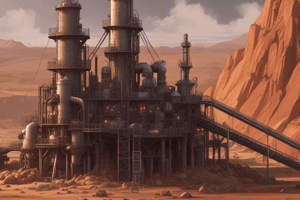Podcast
Questions and Answers
Minerals are not made from organic materials
Minerals are not made from organic materials
Inorganic
The substance is neither liquid nor gas at standard room temperature and pressure
The substance is neither liquid nor gas at standard room temperature and pressure
Solid
Mineral has a uniform chemical composition which consist of specific elements in fixed proportions
Mineral has a uniform chemical composition which consist of specific elements in fixed proportions
Definite Chemical Composition
The atoms in a mineral are arranged in systematic and repeating pattern
The atoms in a mineral are arranged in systematic and repeating pattern
Below the earth surface
Below the earth surface
Earths surface
Earths surface
Formed from mechanical weathering debris
Formed from mechanical weathering debris
Formed when dissolved materials precipitate from solution
Formed when dissolved materials precipitate from solution
Formed from accumulation of plant or animal debris typically contain significant carbon
Formed from accumulation of plant or animal debris typically contain significant carbon
Minerals formed by natural process
Minerals formed by natural process
Flashcards are hidden until you start studying
Study Notes
Definition and Composition of Minerals
- Minerals are inorganic substances, meaning they are not derived from living organisms.
- They exist in solid state at standard room temperature and pressure, differentiating them from liquids and gases.
- Each mineral has a uniform chemical composition consisting of specific elements that are present in fixed proportions.
Atomic Structure
- The atomic structure of minerals is characterized by a systematic and repeating pattern, contributing to their crystalline structure.
Formation of Minerals
- Minerals can form through various processes:
- Mechanical weathering of rocks produces mineral debris.
- Precipitation from a solution occurs when dissolved materials solidify.
- Accumulation of organic matter (plant or animal debris) can lead to the formation of certain minerals; these typically contain significant amounts of carbon.
Location of Minerals
- Minerals are found both below the Earth's surface and on the Earth's surface, occurring in a variety of geological environments.
Natural Processes
- All minerals are formed through natural processes, emphasizing their non-artificial origins.
Studying That Suits You
Use AI to generate personalized quizzes and flashcards to suit your learning preferences.



